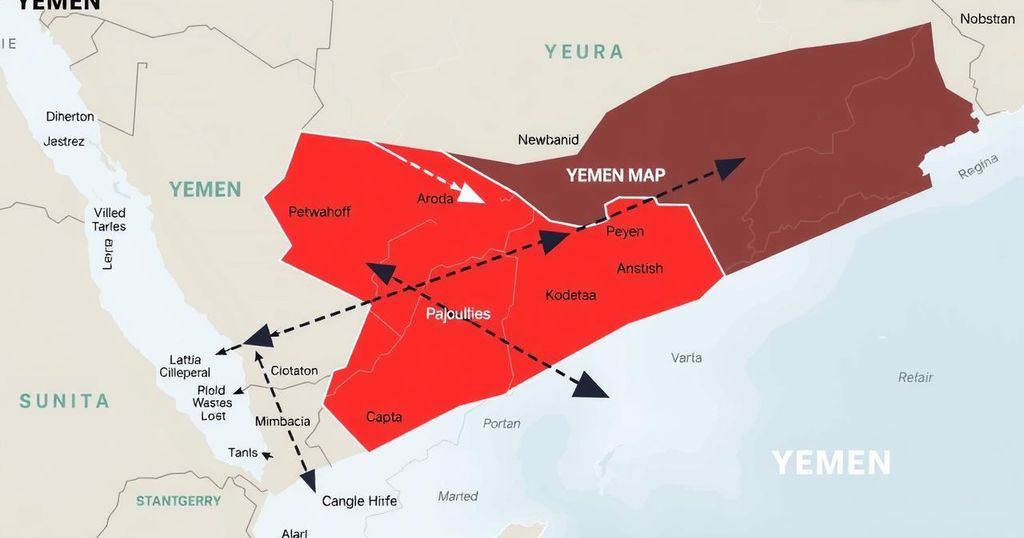Trump Urged to Support Yemen’s Anti-Houthi Forces Amid Escalating Attacks

- The State Department condemns Houthi attacks on shipping.
- Experts urge Trump to support Yemen’s legitimate government.
- Houthi forces threaten international shipping in the Red Sea.
- Israel retaliates against Houthi attacks on vessels.
- U.S. readiness to respond to Houthi aggression remains firm.
State Department Denounces Houthi Attacks on Shipping
In a growing crisis in the region, the U.S. State Department has strongly condemned the Iran-backed Houthi terrorist group for its recent violent escalations against shipping in the Red Sea and its attacks on Israel. This comes amid fresh appeals for former President Donald Trump to support the legitimate Yemeni government in their struggle against the Houthi regime. Notably, Walid Phares, an esteemed American expert on Middle Eastern affairs, raised alarms that Iran appears to be buying time in negotiations with Hamas and Tehran, which could allow their militants to regroup.
Building a Unified Force Against the Houthis
Phares made a case for forming a cohesive ground force made up of loyalists to the legitimate Yemeni government, which is currently in exile in Aden, along with the Southern Transitional Council (STC). This coalition, he argues, could effectively target the Houthi strongholds. He emphasized the importance of funding and training these southern forces to liberate the crucial port city of Hodeidah, while simultaneously sending troops from the north towards Sanaa to put pressure on the Houthi regime. Such a coordinated effort could potentially weaken Iranian influence in Yemen entirely, setting the stage for future negotiations with a stable pro-Western government.
Ongoing Conflict Disrupting Shipping Lanes
On the military front, recent reports indicated that almost two weeks prior, the Houthis targeted a Liberian-flagged vessel, prompting a retaliatory strike from Israel against Houthi positions. This attack is part of the intensified conflict in the Red Sea, where shipping activity has already been severely disrupted. The ramifications are significant—shipping lanes that process approximately $1 trillion in goods annually are at risk. U.S. officials, including Department of Defense spokesperson Sean Parnell, reaffirmed that the military stands ready to take action against any threats posed by the Houthis or their allies. With the deteriorating security, international shipping and the safety of seafarers hang in the balance, underscoring the urgent need for strategic intervention.
Global Trade at Risk Amid Houthi Attacks
The recent escalation of Houthi attacks has claimed lives, injured sailors, and sunk multiple cargo ships in the Red Sea. A spokesperson from the State Department reiterated the U.S. condemnation of the terrorist acts, which have not only disrupted international navigation but also threaten to cause ecological disasters. The ongoing aggression poses a dire challenge to the stability of the region and to global trade, with both Israel and the United States under increasing pressure to respond decisively. It has been quite evident that the Houthis’ message—”Allah is Greater. Death to America. Death to Israel. Curse on the Jews. Victory to Islam”—is a clear reflection of their intentions and stance.
U.S. Foreign Policy Under Scrutiny
With the conclusion of Trump’s military campaign in May, where he stated that the Houthis were unwilling to engage, the decision to halt strikes has raised questions about the implications for American foreign policy in a region fraught with risk. Critics argue that inaction only encourages the Houthi regime to persist with their aggression, threatening maritime security and regional stability. As the Biden administration continues to navigate the complexities of Middle Eastern relations, the shifting political and military dynamics demand a serious reassessment of U.S. strategies against the Houthis and their backers.
In summary, the situation in Yemen has reached a critical juncture. With the Houthis’ aggressive tactics and the significant threat they pose to regional stability, calls for renewed support for Yemen’s legitimate government are intensifying. Concerns over safety in shipping lanes and the overall geopolitical landscape highlight the need for a cohesive response from the international community to curb the Houthi threat effectively.








